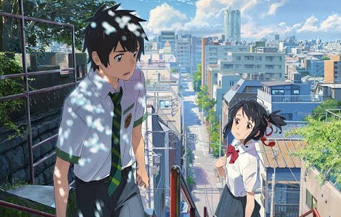Movie Review: Your Name.
By Steven Slater
April 18, 2017
BoxOfficeProphets.com

Your Name. is a Japanese anime film about a young man and woman, Taki and Mitsuha, who appear to wake up having switched bodies every few days. Like just about every film in the body-switch genre, the story plays on the funny quirks of this arrangement, and especially highlights the differences between the sexes. At first, the two are startled at the changes in their bodies. Then, they attempt to live within their new roles as best as possible (they didn’t run to a psychologist?), almost like playing a video game/dream hybrid. For some reason, though, as soon as they fall asleep and switch back, their memories of the “other” become fuzzy and indistinct, like a dream. After a while they try to write each other notes and helpful rules when the situation is somewhat known to them. Then, about halfway through the film, the whole arrangement takes on a much more substantial role, as it becomes apparent there is a greater power at work within these two individuals. Although there is nothing that demands these two specific people be linked by some strand of fate, they soon realize that there is a greater power behind this adventure, and they are filled with a deep desire to figure out what the purpose of their connection is.
Seeing the film for the first time, I think this shift in tone works but not perfectly well; the more slight and comedic angles work, as do the deeper emotional and resonant parts, but I don’t think it quite adds up as much as it could. The second half of the film makes the first half feel a bit insignificant, although I suppose it introduces the characters (I wonder if this changes on repeat viewings). I do love the larger contrasts that are more universal, though. Taki is a young man in Tokyo, getting ready to go to college and become an architect. He loves hanging out with his friends, works at a busy restaurant, and is deep within the hustle and bustle of city life. Mitsuha is a young woman in Itomori, a small country village with a long history. She lives with a sister and grandmother in an old house, almost like a shrine, working diligently to maintain ceremonies and traditions that stretch back a thousand years. Unlike Taki, she yearns to be elsewhere, for a place with something exciting going on. In a moment that raises a few questions, she screams that she wants to be a “handsome Tokyo boy.” These setups and portrayals resonate, and even in the silliness inherent to a lot of anime, the characters come across well. However, after that shift in tone, there could be a huge difference between how a Japanese audience sees the film versus anyone else in the world (and I am not Japanese, if you couldn’t tell from my name. “Your name?” ...yes).
Without trying to spoil too much, let me simply say that this film borrows some of the catastrophic mood from the 2011 Japanese earthquake and tsunami. I can only imagine how strongly a Japanese person would respond, feeling the similarities to that awful disaster. Most people would watch this film and feel something, as it is a very good movie, but a Japanese person might be in tears by the end. In that sense, watching the film is almost more of a cultural experience than just seeing a story on screen. I experienced, in a slightly detached way, what Japanese people felt during that or similar extreme events. Luckily, that and other themes are developed well and resonate with anyone. By the end, that more serious aspect and the relationship between Taki and Mitsuha gives us a warmly developed story about various types of connections, metaphysical or otherwise. This film is about a connection between past and present and future; it’s about a connection between the urban and rural lifestyles; it’s about the forced connection between the two main characters, and how that relationship affects them both. As a bonus, I love seeing animated stories that are not just for kids.
Slater Grade: B+